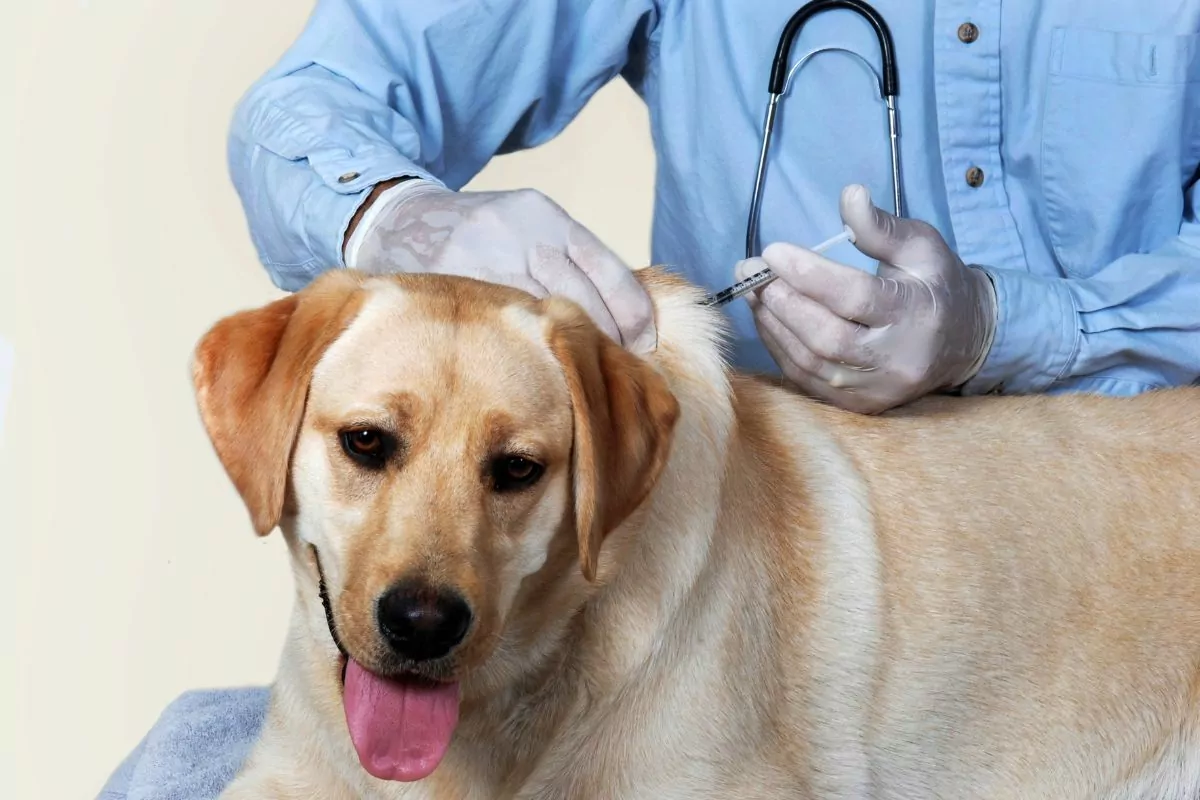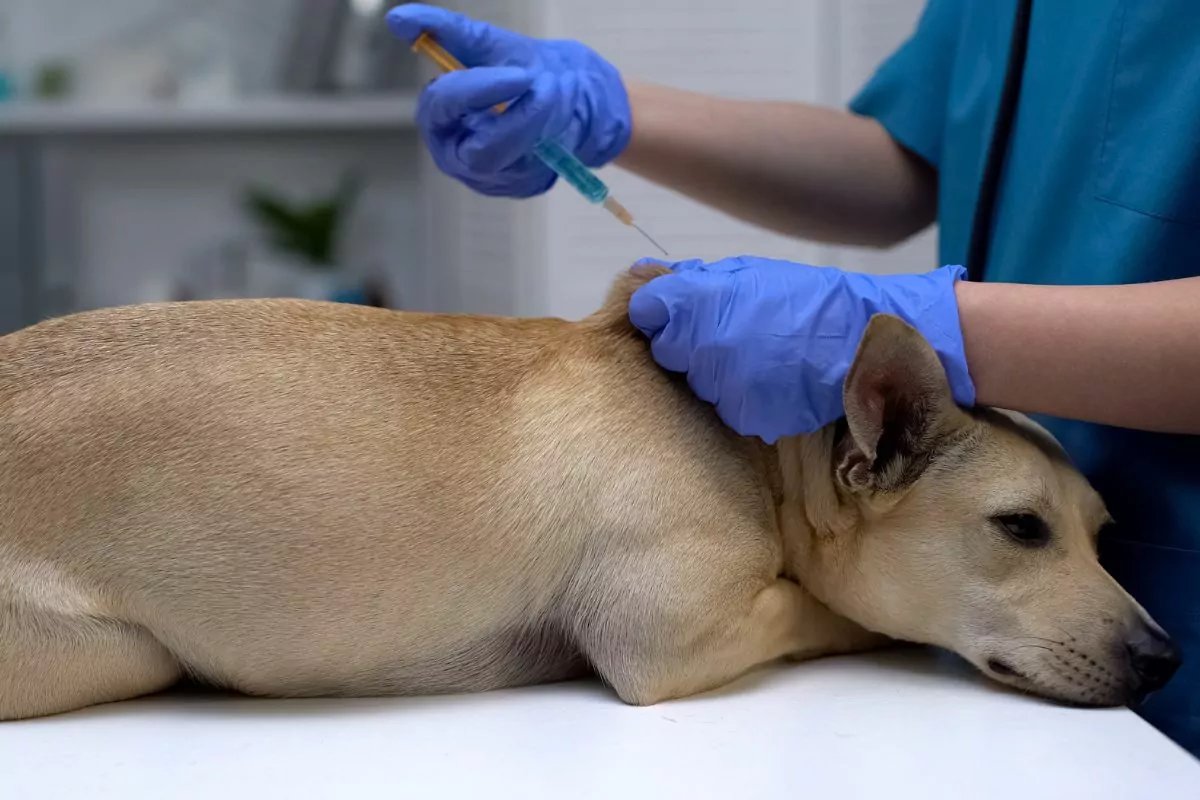“Is there a rattlesnake vaccine?” thinks every dog owner when their pet falls victim to this vicious reptile. Yes, the rattlesnake vaccine for dogs can buy time when taking the pet to the veterinarian.
There are, however, pros and cons everyone warns about. Is it safe? Is it effective? Can someone give a clear answer?
This material has included all the most popular questions about the rattlesnake vaccine for dogs so that one can refer to it easily next time at the vet.

Dogs and Rattlesnakes
Rattlesnakes are dogs’ archenemies. Being venomous reptiles, snakes can cause serious health issues to dogs.
Around 40 percent of all rattlesnake bites cause acute results, and 5 percent of all cases are lethal.
Rattlesnake bite causes extreme swelling (dog’s face or paws), blood loss, shock, and even asphyxiation.
To avoid it, the rattlesnake vaccine is the most reliable solution. So, choosing the suitable vaccine for the pet can save time and reduce uncertainty.
Rattlesnake Vaccine for Dogs – Cost
The question “How much is rattlesnake vaccine for dogs?” is one of the most common ones in the present situation.
The average cost of a single dose of the rattlesnake vaccine for dogs ranges from around $25 to $50. One should also remember the examination fee and case-to-case charges when taking the pet to the veterinary.
The dog will need two booster doses set 4 weeks apart so that the total vaccine check will be around $75 to $150, plus the appointment fees.
One must remember that dogs need annual boosters to stimulate the immune system. It means additional expenses, so including yearly vaccines should enter the regular costs.
Rattlesnake Vaccine for Dogs 一 Side Effects
The snake venom vaccine is totally safe for dogs. It has gone through laboratory tests and government approval successfully. The vaccine has been in practice for many years, and the reports of side effects were minimal.
Of course, it does not mean there are no exceptions. Around 1% of dogs may develop a temporary lump at the injection spot. Still, it is safe and does not bother the animal. Other side effects may include light flu symptoms.
Also, if the dog is ill at the time of vaccination, its condition may worsen. Delaying the appointment is better than putting the pet at risk.
Where Can I Buy a Rattlesnake Vaccine for Dogs?
The rattlesnake vaccine for dogs is available at all veterinary clinics. It is better to rely on professional opinion on the choice of remedy and not pursue self-treatment.
All the vaccine doses that come to the veterinary clinics go through USDA monitoring, so their quality is above suspicion.
Local veterinarians usually offer the vaccine at check-ups when it comes to the areas endemic for rattlesnakes and other venomous reptiles.
In case one wonders if the rattlesnake vaccine is available in their area, referring to the local veterinarian is the best option.
What Does a Snake Bite on a Dog Look Like?
If a rattlesnake bites the dog, the first visual hint would be a massive swelling. Usually, the snake bites end up on the dog’s face or paws so that the node will be noticeable.
Taking a closer look, one will notice two wounds from the snake’s fangs. The space between injuries is usually no more than 0.85 inches (21.7 mm). The problem may arise if the bite site swell – then identifying the snake bite marks on dog is more difficult.
Another sign of a snake bit is bleeding. The owner has to be careful as it may be excessive, potentially causing more severe outcomes.
Can Canines Be Administered a Human Rattlesnake Vaccine?
The rattlesnake vaccine still undergoes the development stage. So it is not clear whether or not it applies to animals.
Furthermore, it is unclear what venom dosage both dogs and humans can handle. Humans can manage a small dose of vaccine, but administering a human vaccine to a dog may have unexpected outcomes due to a lack of scientific evidence.
To paraphrase, it is better to keep the needle back for the time being.
Age Restrictions on the Canine Rattlesnake Vaccine
The earliest age for administering the rattlesnake vaccine for dogs is 16 weeks. As long as the dog is over four months old, it is a good idea to consider vaccination.
The decision is even more rational if the owners live near areas endemic to rattlesnakes. Some dogs are very active, meaning the chance of frequenting large snake territories grows.
Suppose the owners lead an active lifestyle (e.g., hunting, camping, hiking, etc.). In that case, vaccination is necessary as the dog gets exposed to unknown areas.

Are Rattlesnake Bites Hazardous to Dogs?
When they see a snake bite, dog owners should know they are definitely perilous for dogs. Along with a huge swelling and intense bleeding, dogs experience extreme pain. Not to mention, the chance of permanent damage is very high. Read our article and find out Pain Symptoms in Dogs and Cats.
Because rattlesnake venom is a mixture of toxins, it enters the dog’s body and intoxicates it completely. So, if the dog survives the initial bite, the venom can permanently mark the pet’s appearance.
When one realizes the rattlesnake attacked their dog, it is time to rush to the veterinary emergency.
Is the Canine Rattlesnake Vaccine Safe?
Although the effectiveness of the canine rattlesnake vaccine lacks final establishment, its numerous usages prove its safety.
Red Rock Biologics developed a rattlesnake vaccine for horses and dogs under Crotalus Atrox Toxoid (CAT). The CAT’s mechanism of action includes the production of immunoglobulins that bind and neutralize the venom’s proteins.
The official label of the CAT vaccine is “protection against the venom of the western diamondback rattlesnake.” However, Red Rock Biologics state it is effective against other North American rattlesnake venoms.
Rattlesnake Vaccine vs. Antivenin – the Difference
Some owners still have doubts regarding the rattlesnake vaccine. For such occasions, Antivenin can be a substitute.
Antivenin contains antibodies against specific poisons, usually against the snake, spider, and scorpion venom. Being an antiserum, Antivenin is a treatment for snake bites.
In contrast, the rattlesnake vaccine is a preventative medicine that forces the development of a pet’s own antibodies that will mobilize if the snake bites again.
Antivenin, on the other hand, is antibodies ready to act with the injection.
Depending on the situation, either vaccine or Antivenin would be effective.
The Frequency of the Booster Vaccine
A dog should receive at least two vaccination doses with around 30 days in between. In case the dog has exposure to rattlesnakes for about half a year, only one amount is enough to protect the pet from potential bites.
However, if the exposure period is longer than six months, the dog should receive a booster every six months.
How Long Does the Booster Vaccine Last?
As one can guess from the previous section, the optimal vaccine effectiveness period lasts up to 6 months.
The best strategy is to vaccinate the dog around 30 days before active exposure to rattlesnakes. Protection peaks 30 to 45 days after the vaccine shot.
Should Smaller Dogs Receive This Vaccine?
Yes. Smaller dogs always have more difficulty enduring venom than larger dogs. Because of their size, the same amount of venom causes more severe health outcomes.
On the other hand, while the rattlesnake vaccine relieves big dogs’ pain, the same dose can save the life of a smaller canine.
Can a Canine Receive This Vaccine if They’ve Been Bitten Before and Has Received Antivenin?
Yes. The rattlesnake vaccine for dogs does not have horse or sheep proteins to interact with Antivenin.
Red Rock Biologics recommends starting or continuing vaccination at least 30 days after the dog fully recovers from the previous bite.
How Does the Rattlesnake Vaccine for Dogs Work?
The key element of the rattlesnake vaccine for dogs is a safe dose of Crotalus atrox or western diamondback rattlesnake venom. Two other elements – aluminum hydroxide adjuvant and thimerosal – work as preservatives.
The vaccine stimulates the dog’s immune system to produce its own antibodies against the snake bite. On top of that, the vaccine relieves the reaction to the toxin after the bite.
The Benefits of the Vaccine
Veterinarians name three main benefits of the rattlesnake vaccine.
The first one is a better reaction to the recurrent bite. Suppose the dog stumbles upon another snake (let’s say, in the endemic or a particularly warm area). In that case, it will experience much less pain and swelling while on the way to the veterinarian.
In vaccinated dogs, the swelling usually recedes within 20 minutes.
The second benefit of the rattlesnake vaccine is less Antivenin. The latter is rather costly and can have side effects. By vaccinating the dog, the owner earns a significant benefit for its pocket and protects the weakened dog’s organism from additional stress from medication.
Finally, the snake venom vaccine (specifically the antibodies) protects the dog’s vital organs and tissues. So, in case the dog gets another bite, its organism will already be ready to respond.
Other Facts About the Canine Rattlesnake Vaccine
There are other interesting facts about the canine rattlesnake vaccine.
First, the vaccine does not exclude the need for immediate veterinary care. It is essential not to ignore it when the dog seems to handle bites better.
Despite posing the vaccine as universal for most venomous rattlesnakes, it gives no protection from, let’s say, Water Moccasin, Mojave Rattlesnake, or Coral Snake.
Veterinarians also question the immediate vaccine effect. The vaccine’s benefit is prevention, while Antivenin provides immediate help after the bite.
To sum up, the rattlesnake vaccine is definitely not a panacea, but it still increases the chance of successful recovery.
Is This Vaccine for Your Dog?
The final choice – vaccinate or not vaccinate – is for pet owners to make. If you doubt the rattlesnake vaccine will help your dog, discuss it with the local veterinarian.
Still, despite the lack of scientific proof, one shall not worry. The vaccine does not harm, that is for sure.

We’ve Got You Covered
Worrying about your pet is normal, just like making sure they get safe medication. But when the rattlesnake bites, one must react quickly; usually, there’s no time to sit and read about the rattlesnake vaccine.
One must be prepared for accidents like this, knowing enough about the vaccine to stay calm. This material provides the necessary information so that the next time the dog is in the vet, the owner is completely ready. Read our article and find out the most important vaccines for dogs.
